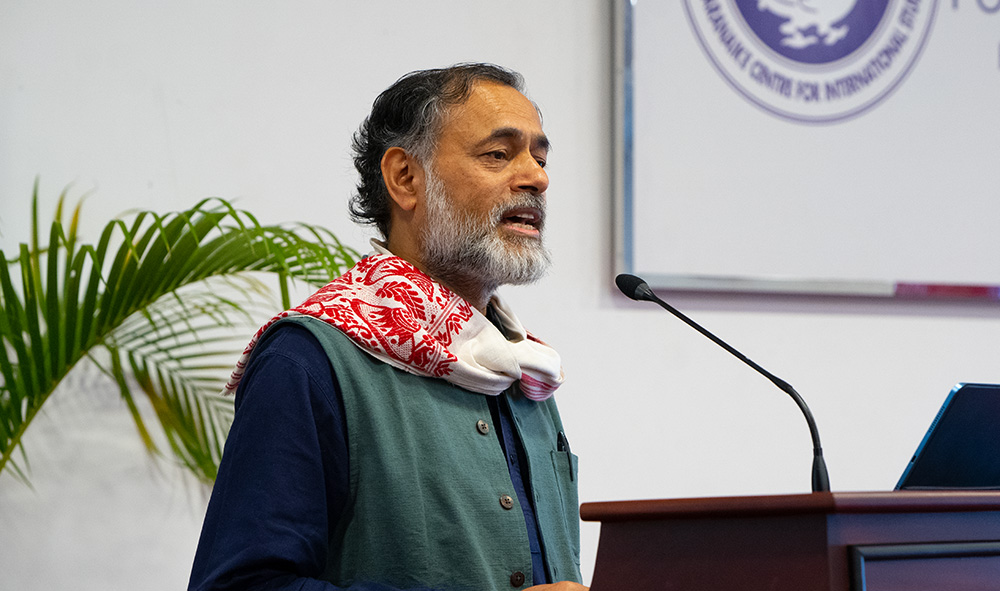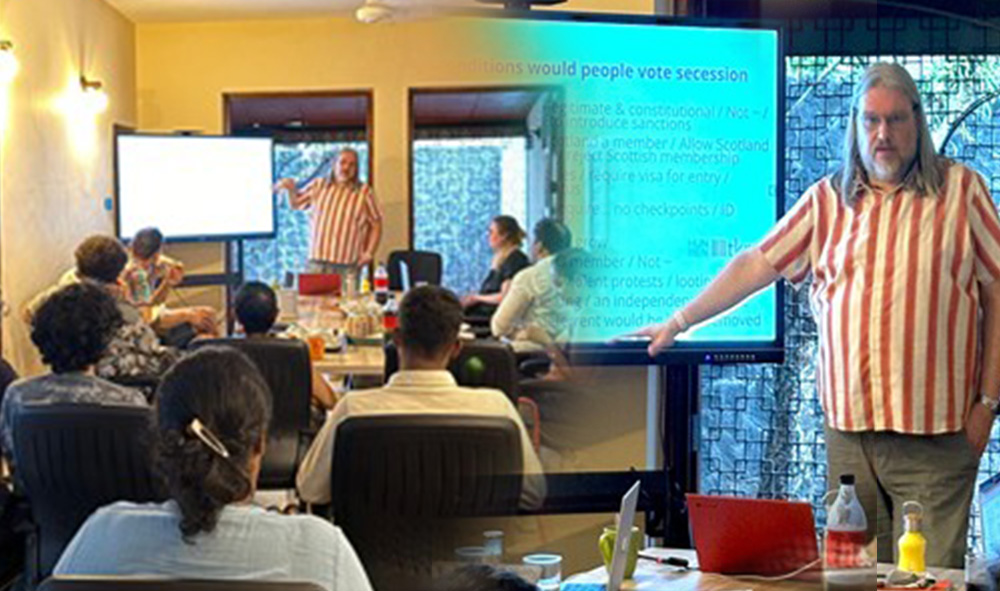Invited Talks
Re-enchanting Democracy- Reflections on South Asia
Prof. Yogendra Yadav
“Democracy is the reigning ideological deity of our times.” Yogendra Yadav, 2025
The SSA, in collaboration with BCIS, hosted Prof. Yogendra Yadav, a renowned Indian scholar, activist, and politician, at the BCIS auditorium on 7th March 2025 to present a lecture titled “Re-enchanting Democracy: Reflections on South Asia”.
Prof. Yadav commenced his lecture by invoking the powerful image of the Aragalaya and describing how it inspired hope and courage within him and the global community, particularly in South Asia. According to him, considering the recent socio-political shifts in Sri Lanka, visiting the country has become a “pilgrimage” for academics and activists alike. Drawing on these changes, he commented on how democracy, though something society is perpetually striving for, is a deeply flawed system that must be drawn into question. He claimed that the current crisis in democracy necessitates re-enchanting it.
He continued by discussing the crisis in democracy in three parts- first, he delved into his point that something is “seriously wrong” with the system of democracy. He described how it is the “dominant orthodoxy” of democracy that prevails in contemporary society, one which is inculcated into the status quo through trade. He argued that this system has created a false image of democracy in which it is pristine and morally just. This image perpetuates the idea that democracy does not produce flawed governance and that the corrupt regimes that have risen within democracies have come to power despite it. Prof. Yadav asserted that such flawed regimes are not an exception to democracy but a norm.
Secondly, Prof. Yadav sought to address the “root of trouble” within democracy. He argued that the conceptualization of democracy is pockmarked with flaws. He discussed how the liberal democratic model that the world has inherited puts forth a series of conditions that need to be met for a country to be considered democratic. These conditions, which include competitive elections, are based on a series of assumptions. According to Prof. Yadav, they assume a pre-existing culture of democracy in any given society, that public need will become a politically expressed demand, that these demands will become a political agenda, and that this agenda will be translated into an outcome. Prof. Yadav was firm in his stance that these assumptions lead to the false belief that there are mechanisms that hold politicians in check and that ensure that they keep their promises.
To conclude his lecture, Prof. Yadav sought to re-enchant democracy, to understand what can be done to salvage it. His solution was simple- he proposed taking the high values of democracy seriously. Importantly, he stressed that these values must be adapted to the necessities of each unique social context, allowing the idea of democracy to broaden past Western political thought. He referred to this solution as Democratic Republicanism which, he elucidated, would focus on the creation of a South Asian ‘Republic’. This Republic would eschew the narrow ideas of Western democracy and instead imbue it with values central to the South Asian lived experience.
Attitudes towards Secession
Prof. Levente Littvay
The SSA hosted Prof. Levente Littvay, a research professor at the HUN-REN Centre for Social Sciences, to present his ongoing research on varying attitudes towards secession on the 19th of March 2025.
This discussion primarily focused on secession, which Prof. Littvay described as the desire of a homogenous group of people to become independent, and the factors that contribute to the varying attitude towards it. These factors include but are not limited to, group identification, economic factors, and partisanship. The discussion used countries such as Scotland, Quebec, and Catalonia as examples to examine secessional attitudes while exploring how Prof. Littvay created his surveys to conduct this research. It delved into the mechanisms behind his research including the methodologies he drew on, especially in relation to populist studies. It concluded with a lively Q&A session which explored his research and the practicalities of developing surveys and survey data analysis.


